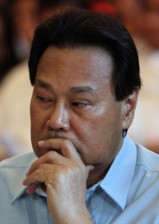Defense lawyers will prepare Chief Justice Renato Corona for what one senator said could be a “make or break” testimony in his impeachment trial.
But when the bell rings, so to speak, it’ll be the country’s top magistrate facing his accusers—and the Filipino people—by himself, said one of his defense counsels, Tranquil Salvador.
“It’s his ball game. He’ll be the one to defend himself and that’s what we want,” Salvador told the Inquirer by phone, about a week before Corona takes the witness stand. “It’s a winner-take-all.”
In the coming days, he said Corona would have a “briefing” with his battery of lawyers in preparation for what questions might be thrown at him, not just by prosecutors but by senator-judges as well.
Corona’s team is a collection of veteran litigators led by retired Supreme Court Associate Justice Serafin Cuevas. Besides Salvador, also in the group are Eduardo de Los Angeles, Jacinto Jimenez, Ramon Esguerra, Joel Bodegon, Dennis Manalo, Jose Roy, Rico Quicho, German Lichauco and Noel Lazaro.
Some of the lawyers earlier expressed reservations over the format of the impeachment trial, which allows senators to fire away any questions.
Salvador said defense counsels could object, but the procedure was apparently limited only to questions by the prosecution. Counsels are barred from objecting to questions propounded by senator-judges, many of whom are not lawyers.
Strip of technicalities
Salvador said senators now wanted to strip the trial of “all procedural technicalities,” a development his camp welcomed.
But Corona, despite his being the Chief Justice, could encounter difficulties when he takes the stand, considering the current complexion of the impeachment proceedings, the lawyer said.
He said the case was not limited to the legal aspect, but involved public opinion or propaganda. He said Corona would prepare for both.
Senate Majority Leader Vicente Sotto III on Wednesday acknowledged that Corona’s testimony could “make or break” his case. He noted that 13 to 15 senators remained “undecided” and preferred to await the Chief Justice’s testimony.
Salvador said Corona’s approach would be simple: “He will simply tell the truth, share his side of the story with all humility in the presence of the senator-judges and the Filipino people.”
He explained the defense’s strategy of requiring the presence of Ombudsman Conchita Carpio-Morales and complainants Rep. Walden Bello, losing 2010 senatorial bet Risa Hontiveros, Harvey Keh, and Emmanuel Tiu Santos.
Morales earlier asked Corona to respond to the allegation that he kept $10 million in foreign currency deposits. Corona repeatedly denied the allegation but refused to reply, saying the Ombudsman had no jurisdiction over him.
The complainants, along with six others, filed three separate complaints against Corona in the Office of the Ombudsman.
Salvador said his camp wanted the complainants to state their allegation “under oath” at the impeachment trial so they could be made “accountable” for it.
In the past, he noted that Representatives Rey Umali and Jorge “Bolet” Banal were able to walk away after claiming to have received copies of supposed Corona bank records from anonymous sources.
Such appeared to have been the case as well with Keh, who claimed to have received alleged records of Corona’s bank transactions.
Though he could not verify the documents, Keh submitted them to Senate President Juan Ponce Enrile, who refused to touch them.
The Inquirer learned that Corona saw these same documents—and realized that they were fake—on Tuesday morning, hours before his lawyers informed the Senate that he would take the witness stand.
Be accountable
“The problem is people bringing out bogus information so the public could chew on it then simply walk away and observe what happens in a corner,” Salvador said. “But you have to be accountable over what you say or do and be able to stand up for it.”
Asked what could happen to Morales and the complainants if their charges would turn out to be false, he said: “First, we have to know the extent of their knowledge or the lack of it, whether there was malice, negligence or oversight. We have to find out the manner by which they got the information. We first have to listen.”
Salvador said the alleged foreign currency deposits were not unlike the allegation about Corona’s purported 45 properties, which lead House prosecutor Rep. Niel Tupas Jr. and his team announced to the media before the trial began.
Senator-judges repeatedly scolded Tupas and company after they were able to present documents on only 21 properties during the trial. The defense and the prosecution later agreed to dispute only that number of property.
Salvador recalled that the prosecution released information on the purported 45 properties four days before trial opened on Jan. 16. He said news on the alleged $10-million deposits surfaced a week before trial resumed last Monday.
“(Those behind the propaganda) trickled information then just walked away no matter what the people thought about it, whether it was true or not. But the damage has been done,” he said.
“The problem now is that truth is not important to them. It’s their advocacy (to remove the Chief Justice). But knowing the truth is different from advancing an advocacy,” he added.
